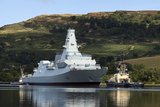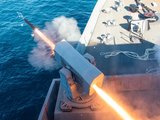EU moving anti-piracy headquarters to Spain
European Union (EU) countries decided on 30 July to move the headquarters of the bloc's anti-piracy Atalanta patrols from London to the Spanish port of Rota on 29 March 2019, when Britain exits the EU.
The member countries also agreed to transfer at the same time the London-based Martime Security Centre Horn of Africa, which informs shipping about piracy threats off Somalia, to the French port of Brest, an EU statement said.
The security centre will remain under the Atalanta command.
The EU launched Atalanta in 2008 to fight brazen acts of piracy off the coast of Somalia, including the spectacular hijacking of a Spanish tuna boat in 2009.
Although the pirates released the crew after receiving a ransom, two of them were detained days later by European military officers.
EU countries ‘decided to relocate the European Union Naval Force (EU NAVFOR) Operational Headquarters from Northwood (UK) to Rota (Spain), and to Brest (France) for the Maritime Security Centre Horn of Africa (MSCHOA) as of 29 March 2019,’ an EU statement said.
The member countries also decided to replace Atalanta's operational commander Major General Charlie Stickland with Vice Admiral Anotnio Martorell Lacave, a Spanish navy commander.
Strickland said in a separate statement: ‘During this time Atalanta will be conducting business as usual with the Force Headquarters and ships remaining deployed and conducting deterrence of piracy and protection of WFP shipping.’
Italian, German and Spanish navy ships currently patrol the waters near Somalia, ensuring in particular the safe delivery of aid from the World Food Programme to Somalia.
EU member states on 30 July also extended by one year the mandate of Operation Atalanta until 31 December 2020, they said in a statement.
The number of attacks off the coast of Somalia in the Indian Ocean has fallen from a peak of 176 in 2011 to seven in 2017 and only one has been recorded since the beginning of 2018.
More from Defence Notes
-
![New opportunities for defence firms as EU steps up support for Ukraine]()
New opportunities for defence firms as EU steps up support for Ukraine
The European Commission is looking for startups and other innovators to address challenges across the land, air and sea domains.
-
![Singapore Airshow 2026: ST Engineering hints at export success for AME assault rifle family]()
Singapore Airshow 2026: ST Engineering hints at export success for AME assault rifle family
The Singapore-based technology company unveiled its new rifle family at this week’s airshow. Chen Chuanren spoke with the ST Engineering’s head of small arms to find out more about how the weapons have been refined.
-
![High tension in the High North – a wake-up call for NATO’s future Arctic defence efforts?]()
High tension in the High North – a wake-up call for NATO’s future Arctic defence efforts?
Any potential ‘Arctic Sentry’ mission would be months in the planning, but with tensions high in the region given the US’s push for Greenland, NATO countries will need to continue to emphasise their commitment to the region, analysts have said.
-
![Venezuela prepares personnel and equipment for a potential second US attack]()
Venezuela prepares personnel and equipment for a potential second US attack
Defence Minister Gen Vladimir Padrino López has declared that the Venezuelan armed forces “will continue to employ all its available capabilities for military defence”.
-
![As the new year starts, the UK defence spending delay continues]()
As the new year starts, the UK defence spending delay continues
The UK’s defence spending commitments remain uncertain as the government’s Defence Investment Plan, which had been due by the end of 2025, is yet to be published.

























